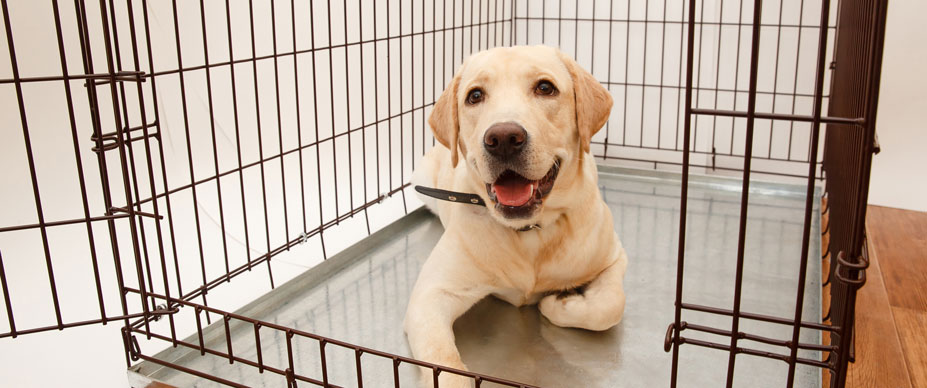Crate Training Your Puppy at Night: Tips & Tricks
After a productive day of play, even the most energetic puppies require rest. Your young dog will need a safe, comfortable environment where they can rest and recharge. That's why many dog trainers and pet parents rely on nightly crate training to keep puppies safe when they cannot be actively supervised.
Key Takeaways
- A crate gives your puppy a safe space to reset and recharge when they cannot be actively supervised.
- Check weight limits on crates to ensure your furry friend is comfortable—remember, they’ll grow!
- Introduce your puppy to the crate slowly with repetition and patience. Be prepared for accidents to happen first, especially if your dog isn’t potty trained.
- Tiring your puppy out with play and exercise earlier in the day will make them more likely to sleep in their crate at bedtime.
Similar to typical dog crate training, evening crate training for your puppy requires the right crate size, placement, and routine. Your puppy will need to grow comfortable with the crate beforehand, which can take time, repetition, and effort.
Many young dogs are initially resistant to the concept of a crate before warming to it. You might notice your puppy cries for the first few nights after you begin crate training. If you're still potty training your puppy, expect accidents—especially if you notice the crate makes your puppy nervous or anxious.
With the right dog crate and a good deal of patience, many puppies come to enjoy the privacy and security a crate can offer. Follow these tips to successfully crate train your puppy at night.
Find the Right Spot for the Crate
It's important to place your puppy's crate in the right location, one that helps promote a sense of calm and safety. Your pup wants to be a part of your world; situate the crate in a place that allows them a wide view of the area so they don't feel left out.
To keep your puppy from feeling isolated, the best spot for a crate is often in an open kitchen, in a corner of the living room, or at the foot of a bed. You'll also want to consider factors like temperature, airflow, and sunlight when deciding where to place your puppy's crate. To ensure your pup stays comfortable during nighttime crate hours, avoid areas of the house that grow too hot or too cold in the evening.
RELATED: Why Do Dogs Scratch Their Beds?
Avoid Food & Water Before Bedtime
Late night and early morning potty breaks can disrupt a puppy's sleep schedule and will oftentimes make nighttime crate training more difficult. To minimize the need for these potty breaks, don't let your puppy eat or drink anything substantial once bedtime approaches.
This approach might sound harsh, but it encourages your puppy to adapt to a regular feeding schedule. Many puppies will visit their food and water bowls whenever they are available, even if it's not time for their next meal. If you can help your puppy avoid food and water before bedtime, you'll help decrease nighttime potty breaks and foster healthy eating and drinking habits.
Wear Your Puppy Out
Puppies are nothing if not energetic. Your puppy will need thorough exercise and mental stimulation during the day to help them learn and grow. A well-exercised puppy is all the more likely to embrace nightly crate training, given how much more appealing their bed will look.
Your surroundings will likely influence how you choose to exercise your pup. If you can, take your dog for safe, frequent walks during the day. This will help eliminate your puppy's excess energy, which can manifest in a variety of destructive ways. In addition, regular walks help familiarize your young dog with new smells, sounds, and other sensory input they'll experience regularly.
Playtime is key for dogs of all ages. Puppies especially benefit from playtime, as it's both an educational and fun experience. It's important that you take steps to protect your puppy during playtime, allowing them to enjoy toys and games in a safe environment.
For many pet parents, outdoor space is limited. Fortunately, you can easily exercise your dog indoors as long as you transform your living space into a safe, educational environment. Safely introduce your puppy to different obstacles, objects, and areas of the home conducive to playtime. Organized correctly, indoor exercise can provide many of the same benefits as outdoor exercise for your puppy.
Go Outside Immediately Before Bed
To help your pup accept the crate, make sure you take them outside immediately before bed. Your puppy will eventually understand the connection between a final trip outside and evening crate time. Many dogs begin to gravitate toward their crate after their final bathroom trip of the day.
Taking your puppy outside right before bed also helps them fully relieve themselves before sleeping. This trip outside is an integral step when you're potty training your puppy. The same approach works well when you begin your day; a routine where you begin and end your day with a trip outside can help your puppy clearly understand the purpose of a potty break.
Don't Play with Your Puppy at Night
To help your puppy distinguish evening activities from daytime ones, don't play with them at night. Establish clear expectations with your puppy that playtime is an activity reserved for daytime hours. Your puppy will eventually understand the time of day, and you can encourage this process with commands and deliberate behaviors.
Note that your young puppy may still need to relieve themselves after the sun goes down. If you notice your puppy keeps having accidents in the house—particularly during evening hours—you may need to give them more potty breaks.
When taking your dog outside to "go" at night, set clear expectations so they understand your intentions. Avoid playing with your puppy or otherwise getting them worked up when you take them outside to potty. Instead, make quick work of any nighttime trips outside so that you and your puppy can get back to sleep once you return inside.
Wake Up Before Your Puppy
Puppies often wake early in the morning, seemingly ready to play within seconds. A puppy's light sleep habits and irregular sleep patterns sometimes make waking up before them difficult to do. However, when it comes to nighttime crate training, it's always best if you can wake up before your puppy.
During this formative period of their life, your puppy will need plenty of rest. As a result, your pooch might spend extensive periods of the day and night sleeping. Waking up before your puppy allows you to get ready for the day and prepare your puppy's food, water, and space.
If you're already awake when your puppy rises for the day, you can immediately let them out of their crate and give them a morning potty break. This decreases the awake time your puppy spends in their crate, helping to foster a strong, positive bond between your dog and their nighttime home.
Be Consistent & Patient
Any type of training with a puppy takes work, and nighttime crate training is certainly no exception. Keep your puppy on a consistent routine and avoid raising your voice no matter how much you might want to. Consistency and patience are key when you're crate training a puppy at night, as results can take time to achieve.
Once your puppy can sleep safely and soundly through the night, crate training becomes entirely worth your efforts. Some puppies take to their crates after only days; others require weeks or months of sustained nighttime crate training before the benefits pay off. Ultimately, crate training is one of many ways you can strengthen your relationship with a new dog.








